Depression and Anxiety are among the most prevalent mental illnesses in the world and seem to be rising in numbers every year. They can often accompany one another and can be particularly difficult to recover from. With more research being done there is an increasing level of awareness for these illnesses thankfully. As we spread awareness we hope to help anyone who experiences depression and anxiety to break out of the vicious cycle they can trap us in. A big area of research to help with this issues, is the use of natural herbs and supplements to reduce depression and anxiety. Here are 5 of the most effective supplements that have been found to potentially reduce depression and anxiety.
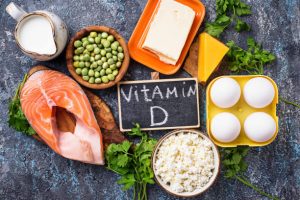
1. Vitamin D
The first supplement on our list is no secret. Vitamin D is a commonly known vitamin essential for our bodies health. It is a fat soluble vitamin that is found in very few foods, which is one reason it a common vitamin for people to be deficient in. Vitamin D is important for several reasons. First, it promotes calcium absorption in our gut, which promotes bone growth as well as modulates cell growth, neuromuscular & immune function, and reduces inflammation. Without Vitamin D our bodies neuronal and glial tissues don’t properly function. This can lead to an increase in cerebral amyloid-beta, which is a protein that decreases the anti-inflammatory and antioxidant properties of our neuronal tissue. Without these anti-inflammatory and anti-oxidizing properties in our brain, the tissue can become damaged and this then induce mental illnesses including Dementia and Alzheimer’s. Low levels of Vitamin D have also been linked with low levels of serotonin, which is the happiness hormone in our bodies.
Luckily there are some very easy ways to ensure you are getting enough Vitamin D in your diet. The first, and in many ways easiest, way to get vitamin d in your system is through UV rays. When UV rays from the sun hit our skin our bodies endogenously produce vitamin d. Of course UV rays have also been found to cause cancer when we get too much of them, so try and aim for about 15 minutes of sun exposure every day. After that put on some sun block or find some shade! Besides sun exposure you can also purchase Vitamin D supplements. Either way, be sure to start getting more Vitamin D in your diet, and see if it makes a difference for you!
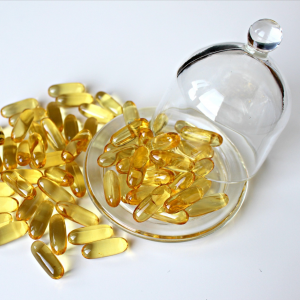
2. Fish Oil (Omega-3 Fatty Acids, EPA & DHA)
The next supplement on our list is fish oil. I say fish oil because that is the most common form of this supplement in a “natural” form, but in reality the molecules that are being utilized by the body here are omega-3 fatty acids, eicosapentaenoic acid (EPA) and docosahexaenoic acid (DHA).
Fish oil supplements are made by extracting oil/fat from fish tissue. The essential fatty acids found in fish oil are extremely important for brain neuron communication in our bodies. These help regulate neurogenesis (the growth and development of nervous tissues), inflammation, and neurotransmission. Studies have found that many people who experience anxiety and depression to show great improvements in those areas when taking fish oil supplements. More research is being done on the exact reason for this, but it is likely due to the fatty acids aiding in brain neuron communication, and the healing and creation of nervous tissue.
Fish oil is the most common form of supplement for these fatty acids but there are other options to explore. Krill oil has become increasingly popular due to some studies finding that the human body may absorb krill oil better. Also krill oil has been found to have more antioxidants than fish oil, which is always a benefit. For people looking for a plant-based source of essential fatty acids, Flax seed is a great option.
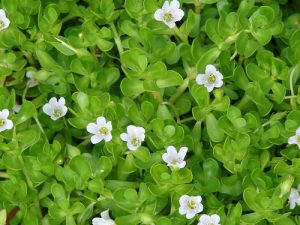
3. Bacopa
Bacopa is probably the first thing on our list that you might not have heard of. It is an ancient plant that has been used in Ayurveda for generations. This plant contains high levels of antioxidants, which neutralize free radicals and their damage to our brain and tissues. This plant also has anti-inflammatory properties by suppressing our bodies release of inflammatory enzymes and cytokines. Bacopa is also considered to be an adaptogenic herb, meaning it increases the bodies resistance to stress. Stress can often be a precursor to anxiety and depression so helping our body better deal with stress can definitely be beneficial. This may reduce the levels of cortisol in our bodies which would therefor decrease levels of anxiety.
Historically Bacopa was consumed with ghee, not surprisingly since ghee is also a common food in Ayurveda. Bacopa is fat soluble and requires a lipod transporter in order for the body to absorb it so it should be taken with some form of food, or as stated above with ghee.
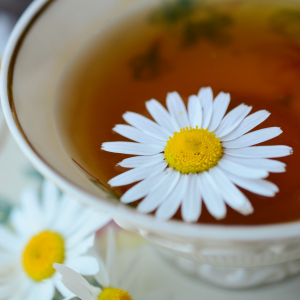
4. Chamomile
Chamomile is an herb that is found in the flowers of the Asteraceae plant family. Most commonly consumed as Chamomile tea, this herb has long been thought to be a natural remedy for numerous health issues, including anxiety and depression.
Chamomile contains apigenin, which is an antioxidant that binds to certain receptors in the brain and may promote relaxation and sleepiness. Along with it’s anti-oxidizing properties, chamomile is also helpful in digestion aid and general gut health.
The exact reason that chamomile is effective in reducing anxiety and depression is uncertain, but most people believe it likely has to do with the high level of antioxidants, and the calming properties on the mind, gut and body.
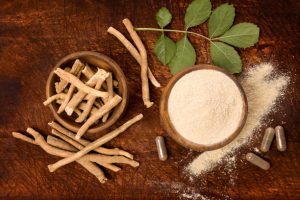
5. Ashwagandha
The 5th and final supplement on our list is another herb that has long been prevalent in Ayurveda. Ashwagandha is a plant in the Solanaceae (nightshade) family. The root of the plant is what is commonly consumed as a herbal remedy to provide a wide range of health benefits.
Ashwagandha root has been found to reduce blood sugar levels, cortisol levels and has been found to regulate chemical signaling in the nervous system. These all can help reduce stress, anxiety and depression.
Ashwagandha is one of the most studied supplements on this list, and has a great amount of research that supports its efficacy in the reduction of anxiety and depression with minimal negative effects. The root can be easily consumed daily in a tablet form and also has anti-inflammatory properties, as do most of the supplements on this list.
Supplement Brands
When purchasing supplements, it is always important to do your research and make sure that the quality of the products is high. Many supplement companies will cut their products with chemicals and toxins that you don’t want to consume. Here is a list of some trusted supplement companies, but be sure to do your own research to find what works best for you!
- Thorne Research
- Gaia Herbs
- Garden of Life
- NOW
- Onnit
Sources
- Anjum, I.; Jaffery, S.; Fayyaz, M.; Samoo, Z.; Anjum, S. (2018, July 10). The Role of Vitamin D in Brain Health: A Mini Literature Review. Cureus. Retrieved from https://www.ncbi.nlm.nih.gov
- Amsterdam, J.; Shults, J.; Soeller, I.; Mao, J.; Rockwell,K.; Newberg, A. (2012, Sep 18). Chamomile (Matricaria Recutita) May Have Antidepressant Activity in Anxious Depressed Humans- An Exploratory Study. Altern Ther Health Med. Retrieved from https://www.ncbi.nlm.nih.gov
- Natacci, L., M Marchioni, D., C Goulart, A., Nunes, M. A., B Moreno, A., O Cardoso, L., … M Bensenor, I. (2018). Omega 3 Consumption and Anxiety Disorders: A Cross-Sectional Analysis of the Brazilian Longitudinal Study of Adult Health (ELSA-Brasil). Nutrients, 10(6), 663. doi:10.3390/nu10060663
- Aguiar, S., & Borowski, T. (2013). Neuropharmacological review of the nootropic herb Bacopa monnieri. Rejuvenation research, 16(4), 313–326. doi:10.1089/rej.2013.1431
- Chandrasekhar, K., Kapoor, J., & Anishetty, S. (2012). A prospective, randomized double-blind, placebo-controlled study of safety and efficacy of a high-concentration full-spectrum extract of ashwagandha root in reducing stress and anxiety in adults. Indian journal of psychological medicine, 34(3), 255–262. doi:10.4103/0253-7176.106022


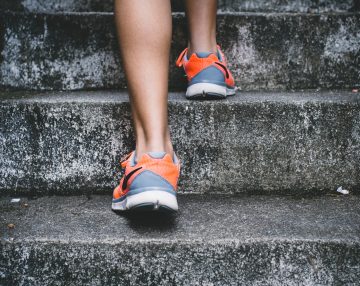

Leave a comment